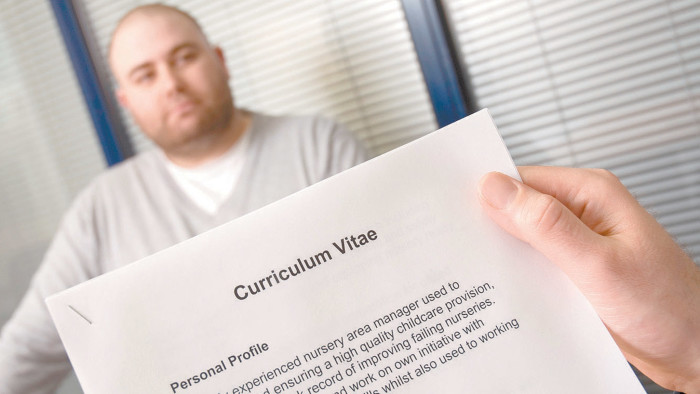Smart questions root out CV liars

Roula Khalaf, Editor of the FT, selects her favourite stories in this weekly newsletter.
It’s the episode of The Apprentice everyone looks forward to, when the remaining candidates face the interviewers, their CVs are scrutinised and the liars are caught red-handed.
But how many people lie, or at least embellish, their work experience and skills? According to LinkedIn-based research by Adecco, the UK’s largest recruiter, one in 10 people have lied on their LinkedIn profile.
Ten per cent have lied about their qualifications and 9 per cent about job titles, while 9 per cent have told the odd fib about their age, 7 per cent about their university and school and 5 per cent about the length of time in a particular job or experience.
Recently, Dennis O’Riordan, a top UK barrister, was forced to quit after his Oxford degree and Masters at Harvard were exposed as bogus. Since being called to the Bar in 1993 he had worked at top chambers and banks, but was finally exposed when applying for another job and in September was suspended from practice for three years by an independent disciplinary tribunal.
Subsequently the Bar Standards Board, which regulates barristers, received fresh evidence about Mr O’Riordan and in January successfully appealed to have him disbarred.
For some, the figures are not surprising. “You always get some people fabricating information on their CVs. In a challenging marketplace, people want to get a foot in the door,” says Alex Fleming, managing director of Adecco UK.

But the key to catching them out is having a good interviewer who can adequately scrutinise the details of a candidate’s skills and experience. “An interviewer who has knowledge of the sector that a specific job is for can ask the relevant questions,” adds Ms Fleming. This ensures that those fabricating CVs can be weeded out.
The key is to find any gaps in a CV and dig into these: if someone has not outlined exactly what they have been doing, dates, length of time in or out of a job and education, then it needs investigating.
Adecco uses two interview techniques, one is competency-based and the other Ms Fleming calls strength-based. The first method teases out whether someone really has the relevant skills and the second involves firing short quick questions that make candidates think on their feet. “Liars can’t answer so fast,” she says.
Jonathan Flint is also not surprised by the results. “If you’d ask me to guess, I would have said about 10 per cent of people lie on their CV.”
Mr Flint is co-founder of Hello My Name Is, a recruitment portal that lets job seekers promote themselves via video. It helps recruiters see the personality behind the CV and gives prospective employees a chance to promote themselves in an interactive and engaging way.
“I’ve seen people who say they’re directors, but are in fact managers,” he says, and, like Ms Fleming, he believes a thorough interview will get to any hidden truths.
“If you go through the CV in the interview, those who are lying give woolly answers and are evasive.” He highlights how it is very difficult to lie face to face, or to a video camera, especially about your age, which is why he believes his portal is a good way for recruiters to select potential candidates.
He also highlights that you have to fish beyond any references given. It is astonishing to think that no one thought to check the background of Mr O’Riordan, especially since he was operating at such a senior level.
“Try to speak to ex-bosses, colleagues, or those who’ve worked for them, but assure those you speak to of your discretion. References really are a key part of the process,” adds Mr Flint. “Don’t just use those at the bottom of the CV.”
One person who is surprised by the research is Matthew Pack, chief executive of Holiday Extras, which sells travel add-ons such as airport hotel and parking bookings. But he is confident his company has a thorough process to weed out those who lay claim to certain skills and experience, which, when it comes to the interview, they clearly do not have.
He has also come across people who simply copy and paste sample paragraphs from websites on to their CV. “In the interview it becomes apparent that what they’ve said on their CV clearly isn’t them and they’ve not taken the time to write it,” he adds.
“Some of our roles also require a test: computer programmers, for example.” In the past, he has had candidates that said they had up to five years experience with programs such as Java or PHP, but in tests, “they just don’t cut it”.
For some, it may seem easy to hide behind a fabricated CV in order to get to speak to someone, but this is likely to become harder as the use of digital tools increases.
“Employers are using LinkedIn more and more and the fact it asks for endorsements really helps,” says Ms Fleming. “The majority of employers use it in addition to a CV, using the two to get to the bottom of any lies.”
Mr Flint believes that “with varying social channels, it’s difficult to mask your identity and background”, while Mr Pack believes the LinkedIn endorsement feature is also very powerful and is even suspicious of senior people who do not have an online profile.
But in a competitive jobs market, how can you promote yourself without lying? One thing Mr Pack believes is missing from job applications these days is a good covering letter. The CV is where you provide the facts in detail, but a covering letter is the opportunity “to make it relevant”, he says. “Most employers are taking people on because they are growing, so you need to say how you can add value to the company.”
But if you still think you might chance it, consider this: you could go to prison. In 2010 Rhiannon Mackay, then 29, was jailed for six months after she lied on her CV to get the job of capital projects administrator with Plymouth Hospitals NHS Trust.
She was convicted under the Fraud Act 2006, making her the first woman to go to jail for falsifying a CV.
Comments